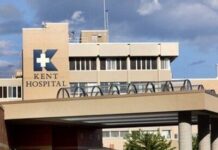
Carrie Bridges Feliz was recently named director of community health services for Lifespan. Bridges Feliz has worked for the R.I. Department of Health, focusing on minority health, women’s health, and primary and rural health. She also served as a public health prevention specialist for the Centers of Disease Control and Prevention, where she concentrated on the health of refugees living in Rhode Island, HIV, tuberculosis and infectious diseases.
PBN: As you take the reins at Lifespan Community Health Services, is there one group in Rhode Island whose health is of particular concern?
BRIDGES FELIZ: The mission of Lifespan Community Health Services (LCHS) is to develop, implement and evaluate initiatives to improve the health status of people in the communities served by our affiliates. While LCHS will continue to work on an array of population health improvement strategies, I remain especially concerned about the health of low-income communities. I look forward to partnering with communities to develop comprehensive place-based approaches that leverage local expertise, the resources of Lifespan, and the efforts of other organizations to improve health and well-being.
PBN: There has been some misinformation surrounding immunizations in the media during the last several years. Are you looking forward to combatting some of the anti-immunization sentiment in your new role?
BRIDGES FELIZ: For many years, LCHS has partnered with the RI Department of Health to offer immunizations and flu clinics to uninsured and low-income Rhode Islanders, on the order of 1,000 to 1,200 per year. We absolutely look forward to continuing to provide this needed service and to optimizing our communications with community partners and the general public. Even post-implementation of health reform, we know that there are many Rhode Islanders who have not or cannot access the preventive services provided under the Affordable Care Act. We see a continuing role for Lifespan in helping to fill that gap.
PBN: What types of screenings does Lifespan Community Health Services focus on the most, and how does it make contact with the people most in need of screening?
BRIDGES FELIZ: LCHS offers biometric screenings including cholesterol, glucose, blood pressure with stroke assessment, Sun Smarts for skin cancer with DermaScan, and body fat analysis with body awareness programs. We construct programs to reach at-risk populations but we also receive regular requests for our services from neighborhood organizations. We, of course, are happy to oblige as many requests as we can but at the same time, we need to get further “upstream” in our preventive efforts through partnerships with organizations that will help us to amplify our impact.
PBN: Having been in the public health field in Rhode Island for ten years, where would you say health education is today among the state’s citizens compared to when you began?
BRIDGES FELIZ: It does seem that the residents of Rhode Island are becoming more sophisticated in their understanding of health and all of the non-physical factors that influence health status. That said, there is a need for health education to be more inclusive of the social, emotional and environmental domains of health. Public health practitioners, and LCHS in particular, are in a unique position to help broker thoughtful, robust conversations about health between health care providers and the public.
PBN: What kinds of training does Lifespan Community Health Services provide?
BRIDGES FELIZ: LCHS operates the Lifespan Training Center which offers low-cost classes that result in American Heart Association certification for CPR, Basic Life Support, Heartsaver First Aid, and Heartsaver AED (infants and adults). We also offer free trainings that do not result in a certification, including Family & Friends CPR and Safe Sitter. In addition to the Lifespan Training Center programs, LCHS provides Healthwise health education programming and facilitated discussion of the Unnatural Causes video series.












